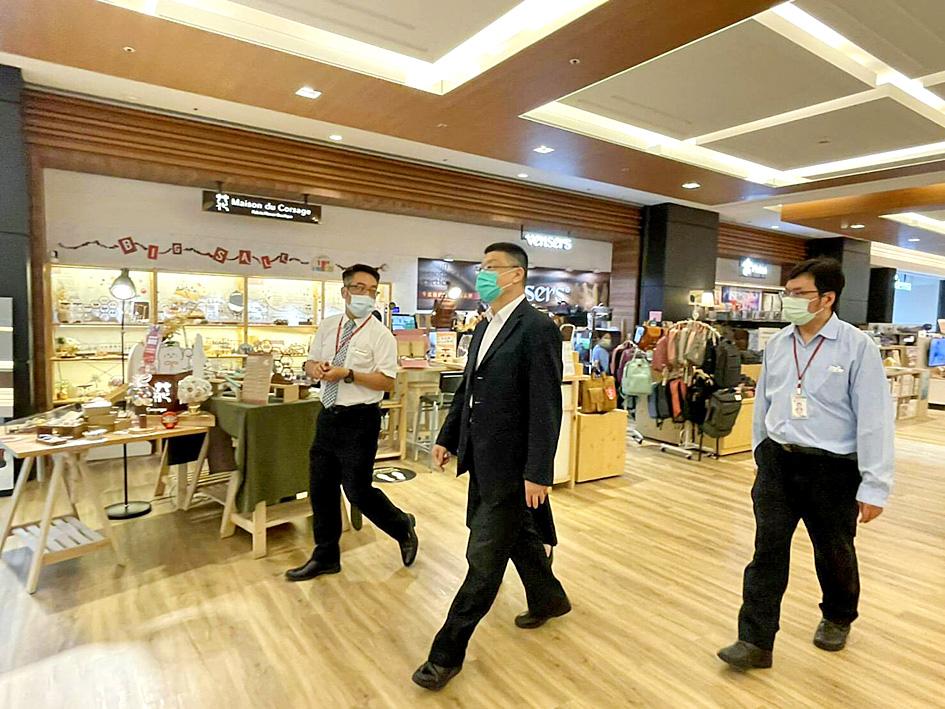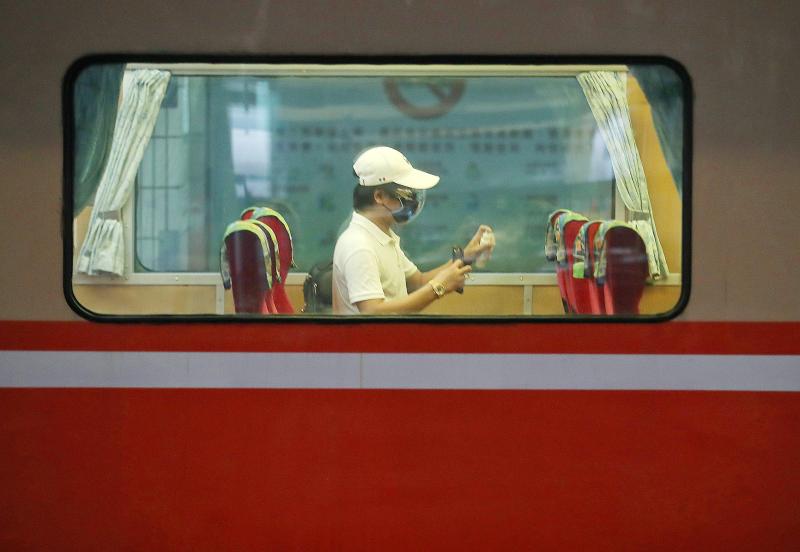The Taiwan Railways Administration (TRA) has proposed that retail stores at railway stations be allowed to pay half their rent and royalties to weather challenges caused by a nationwide level 3 COVID-19 alert.
Ridership on railway services has declined dramatically as people have been encouraged to stay at home as much as possible under the alert. This has hurt retail stores and restaurants at railway stations, which depended heavily on business generated by foot traffic.
Some lawmakers at a meeting of the legislature’s Finance Committee on Tuesday seconded a motion asking the TRA to consider reducing the rent and other expenses for retail stores at railway stations.

Photo courtesy of the Taiwan Railways Administration
TRA Director-General Du Wei (杜微) on Tuesday afternoon inspected the Taipei and Nangang railway stations, and spoke with some managers of retail stores and restaurants who are trying to generate more revenue by working with food delivery services or giving discounts to people ordering takeout.
They told him that their revenues over the past four weeks only accounted for 10 to 30 percent of revenues prior to the level 3 alert, the TRA said, adding that some of the stores have temporarily suspended operations.
“While the agency did not receive any relief funds from the government this time, we will follow the motion proposed by lawmakers to help businesses weather this difficult time,” Du said.

Photo: CNA
The agency’s proposal says that businesses at railway stations would only be required to pay half their rent and royalties from May 15 to Aug. 31, while the rent from this month through August can be paid in September.
The Ministry of Transportation and Communications must approve the proposal before it can be implemented.

SHIPS, TRAINS AND AUTOMOBILES: The ministry has announced changes to varied transportation industries taking effect soon, with a number of effects for passengers Beginning next month, the post office is canceling signature upon delivery and written inquiry services for international registered small packets in accordance with the new policy of the Universal Postal Union, the Ministry of Transportation and Communications said yesterday. The new policy does not apply to packets that are to be delivered to China, the ministry said. Senders of international registered small packets would receive a NT$10 rebate on postage if the packets are sent from Jan. 1 to March 31, it added. The ministry said that three other policies are also scheduled to take effect next month. International cruise ship operators

HORROR STORIES: One victim recounted not realizing they had been stabbed and seeing people bleeding, while another recalled breaking down in tears after fleeing A man on Friday died after he tried to fight the knife-wielding suspect who went on a stabbing spree near two of Taipei’s busiest metro stations, Taipei Mayor Chiang Wan-an (蔣萬安) said. The 57-year-old man, identified by his family name, Yu (余), encountered the suspect at Exit M7 of Taipei Main Station and immediately tried to stop him, but was fatally wounded and later died, Chiang said, calling the incident “heartbreaking.” Yu’s family would receive at least NT$5 million (US$158,584) in compensation through the Taipei Rapid Transit Corp’s (TRTC) insurance coverage, he said after convening an emergency security response meeting yesterday morning. National

PLANNED: The suspect visited the crime scene before the killings, seeking information on how to access the roof, and had extensively researched a 2014 stabbing incident The suspect in a stabbing attack that killed three people and injured 11 in Taipei on Friday had planned the assault and set fires at other locations earlier in the day, law enforcement officials said yesterday. National Police Agency (NPA) Director-General Chang Jung-hsin (張榮興) said the suspect, a 27-year-old man named Chang Wen (張文), began the attacks at 3:40pm, first setting off smoke bombs on a road, damaging cars and motorbikes. Earlier, Chang Wen set fire to a rental room where he was staying on Gongyuan Road in Zhongzheng District (中正), Chang Jung-hsin said. The suspect later threw smoke grenades near two exits

The Forestry and Nature Conservation Agency yesterday launched a gift box to market honey “certified by a Formosan black bear” in appreciation of a beekeeper’s amicable interaction with a honey-thieving bear. Beekeeper Chih Ming-chen (池明鎮) in January inspected his bee farm in Hualien County’s Jhuosi Township (卓溪) and found that more than 20 beehives had been destroyed and many hives were eaten, with bear droppings and paw prints near the destroyed hives, the agency said. Chih returned to the farm to move the remaining beehives away that evening when he encountered a Formosan black bear only 20m away, the agency said. The bear